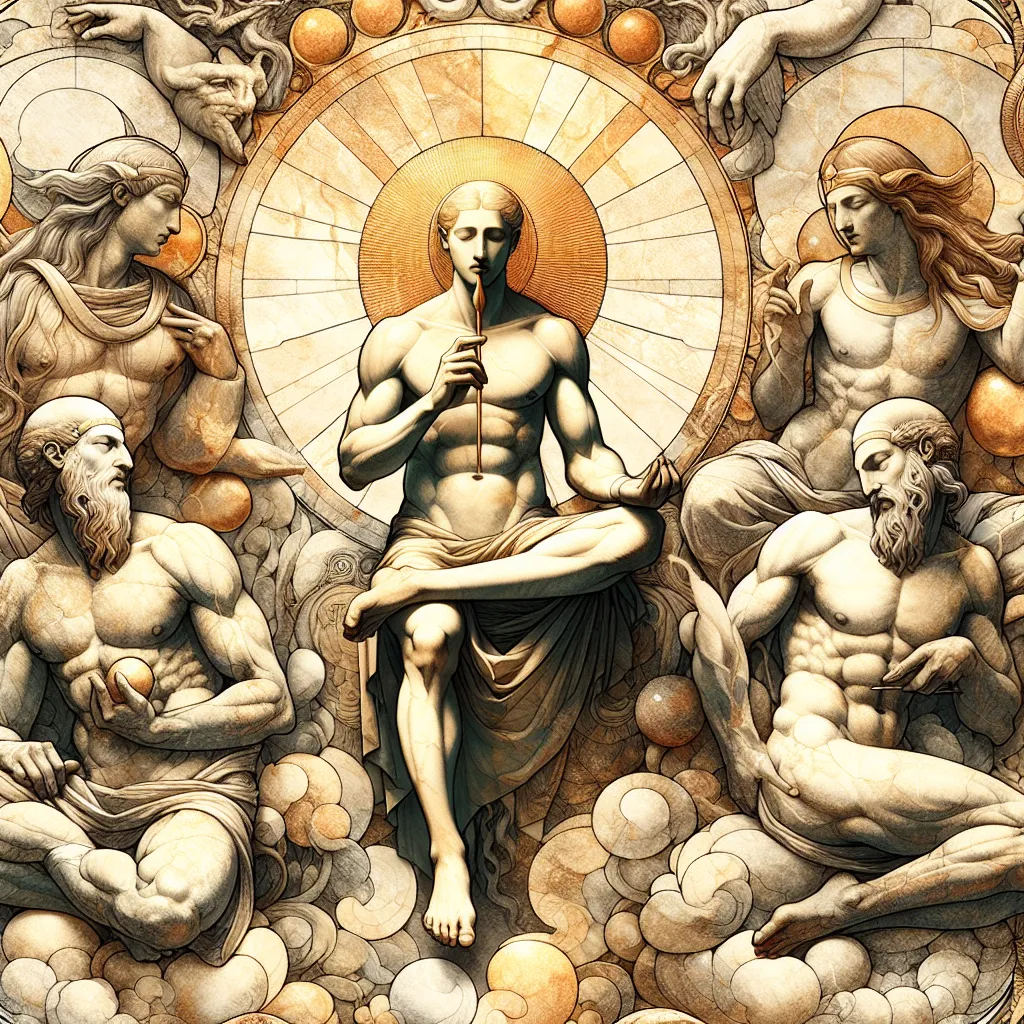
- Published on
- Authors

- Name
- You
The Breath of Ra: Solar Deities and Breath in Egyptian Mythology
In the vast tapestry of Egyptian mythology, the sun god Ra occupies a central role. Often depicted as a falcon-headed man crowned with a solar disk, Ra's influence stretches far beyond mere heliocentric symbolism. A particularly fascinating aspect of Ra's mythology is the association of breath—both a physical phenomenon and a metaphysical force—with his divine essence. This article delves into the multifaceted relationship between breath and solar deities in Egyptian lore, weaving together ancient mystical wisdom and contemporary scientific understanding.
The Symbolism of Ra and the Vital Breath
Ra: The Sun God
Ra, the principal deity of the Egyptian pantheon, is inherently tied to the sun's life-giving energy. He is believed to journey across the sky by day and traverse the underworld by night, ensuring the continuous cycle of life, death, and rebirth. This cyclical nature reflects the indispensable role of the sun in sustaining terrestrial existence.
The Breath of Life
In ancient Egyptian thought, breath was more than just a biological necessity; it represented a fundamental life force. The term "shu" (also a deity personifying air) embodies the concept of breath as a sustaining power. Shu, depicted as holding aloft the sky, underscores breath's role in maintaining cosmic order.
Bridging Mystical Wisdom and Modern Science
Mysticism: Breath as Prana
In Egyptian mysticism, breath is synonymous with "ka," the vital essence. This aligns with the concept of prana in Hindu tradition or qi in Chinese philosophy. Breath, thus, becomes a conduit for divine energy, linking mortals to the gods.
Science: Breath and Solar Influence
From a scientific perspective, breath can be examined through the lens of photosynthesis and cellular respiration. The sun's energy, captured by plants, is transformed into oxygen—a vital element in our respiratory processes. This scientific phenomenon illustrates a tangible connection between the sun's influence and the sustenance provided by breath, grounding ancient mystical insights in modern biology.
| Aspect | Mysticism | Science |
|---|---|---|
| Deity | Ra, the Sun God | Solar influence on photosynthesis |
| Life Force | Breath as "ka" or "shu"; vital essence | Oxygen as a byproduct of photosynthesis; essential for respiration |
| Symbolism | Breath as a conduit for divine energy | Molecular exchange in cells; energy transformation |
| Cycle of Life | Day/Night journey of Ra symbolizing life, death, and rebirth | Respiratory cycle; exchange of oxygen and carbon dioxide |
Ra's Breath in Mythological Texts
The Pyramid Texts
Ancient inscriptions such as the Pyramid Texts provide rich narratives about the breath of the gods. One notable passage states, "May you breathe the sweet breath which comes forth from the nose of Ra." This articulates the notion of breath as a divine gift, a direct blessing from the solar deity.
The Book of the Dead
Similarly, the well-known Book of the Dead contains spells and incantations emphasizing the importance of breathing in the afterlife. The phrase "I receive the breath of life from Ra" recurs, underscoring the dependence on the solar deity for spiritual existence beyond mortal life.
Ritual Practices Involving Breath and Ra
Solar Meditation
Ancient Egyptians practiced meditative rituals at dawn and dusk, aligning their breath with the rising and setting sun. These practices were believed to harmonize the practitioner's life force with Ra's cyclical journey.
Incantations and Offerings
Rituals often included invocations to Ra, with offerings accompanied by rhythmic breathing to symbolize the inhalation of divine energy and the exhalation of human gratitude. These ceremonies served to reinforce the sacred bond between deity and devotee.
Conclusion: The Eternal Breath
The intricate association of breath with Ra in Egyptian mythology transcends simple symbolism, melding celestial worship with metaphysical and scientific insights. This profound connection underscores breath not merely as a biological function but as a bridge between the corporeal and the divine. The blend of ancient wisdom and modern science invites us to appreciate the sacredness of the breath we take, an eternal link to the gods of old, and a testament to the enduring life-giving power of the sun.
